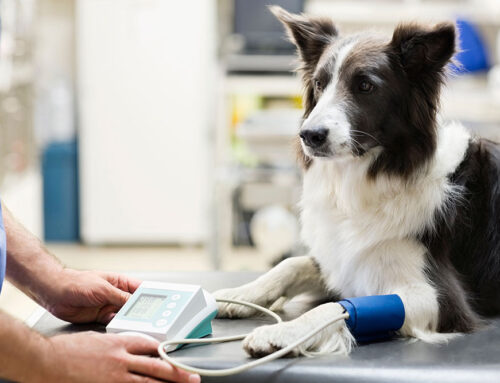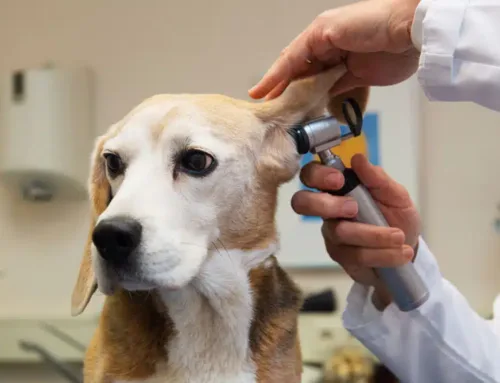As a French bulldog lover, you’re likely aware of their irresistible charm, comical expression, and playful personality. But in addition to their one-of-a-kind looks and personality, this popular breed also comes with unique health considerations. To help you ensure your fun-loving “Frenchie” enjoys a long, healthy, and happy life, the Fairfax Veterinary Clinic team has created a guide to French bulldog care considerations, focusing on key health issues and proactive measures you can take to ensure their well-being.
Common French bulldog health concerns
While some French bulldog conditions are inherited, veterinary screening exams and twice-yearly wellness visits can ensure early diagnosis and help you manage your dog’s signs. Your veterinarian’s guidance is also key to safeguarding your French bulldog against preventable conditions and making wise decisions about their daily care. Common French bulldog health conditions include:
- Brachycephalic obstructive airway syndrome (BOAS) — The French bulldog’s iconic short nose and flat face define them as a brachycephalic—flat-faced—breed. Unfortunately, these unique features also predispose them to significant respiratory issues, collectively referred to as BOAS. BOAS signs may include noisy breathing, exercise intolerance, unusual gum color, and snorting. In addition to monitoring your French bulldog for noticeable signs, your veterinarian can screen them for visible structural abnormalities such as narrow or collapsed nostrils, an elongated soft palate, and a narrow trachea.
- Obesity — Like many breeds, French bulldogs are prone to obesity if their nutrition and exercise are improperly balanced. The Frenchie’s obesity risk is heightened by their adorable looks—making them easy to spoil—and physical limitations such as heat intolerance, airway abnormalities, and stocky build. Consult your Fairfax Veterinary Clinic veterinarian to ensure you’re feeding your French bulldog a balanced diet appropriate for their age, body condition, and activity level. Avoid overfeeding and limit treats to prevent weight gain. Incorporating regular exercise into their daily routine, such as walks and playtime, will help keep them fit and active.
- Heatstroke — The French bulldog’s compromised respiratory system makes them sensitive to heat. With a shortened muzzle and narrow airway, French bulldogs cannot adequately cool incoming air and can quickly succumb to heatstroke if exposed to high temperatures for prolonged periods—sometimes as few as 10 minutes. Limit your Frenchie’s outdoor time during warm weather and ensure they always have access to shade and fresh water. Avoid strenuous exercise during peak heat hours, and never leave your dog unattended in a parked car. Supervise your French bulldog outdoors and monitor them closely for warning signs such as excessive panting, drooling, and weakness. Seek immediate veterinary attention if these or other concerning signs appear.
- Allergies — Like people, French bulldogs can suffer from allergies to various environmental triggers, including pollen, dust, mold, and certain foods. Monitor your French bulldog for allergy signs, including itching, redness, skin rashes, and ear infections. Your veterinarian will perform various tests to identify the specific allergens affecting your Frenchie and recommend appropriate management strategies such as bathing, medication, environmental management, or a diet change. Regular bathing, grooming, and wrinkle care help promote a healthy skin barrier and help you notice minor skin irritations before they become serious problems.
- Reproductive emergencies in unspayed female French bulldogs — The French bulldog’s characteristic large head and unique anatomy cause mating and reproductive challenges. Cesarean section delivery is required to ensure the health and safety of both mother and puppies. If you are considering breeding your French bulldog, consult a veterinary reproductive specialist and a reputable and experienced breeder. If you do not plan to breed your French bulldog, spaying and neutering will eliminate this health risk and minimize or eliminate certain cancers.
- Heart disease — Unfortunately, French bulldogs are predisposed to certain congenital heart conditions, including mitral valve disease, pulmonic stenosis, and dilated cardiomyopathy (DCM). Regular veterinary exams and cardiac screenings are essential for early heart disease diagnosis and management. Early detection and intervention can often ensure your French bulldog enjoys a relatively normal life.

- Back problems — French bulldogs are predisposed to intervertebral disc disease (IVDD) and disc herniation. This chronic condition can lead to sudden paralysis and may require emergency surgery. Maintaining your Frenchie at a healthy weight and discouraging high-impact activity, such as jumping up and down and sudden twisting or turning, may reduce your French bulldog’s IVDD risk.
The special attention your French bulldog deserves
Your French bulldog requires diligent attention and proactive veterinary care—but the well-tempered Frechie’s irresistible looks and comedic charm make the effort worthwhile. By educating yourself about French bulldog health and scheduling regular visits with our Fairfax Veterinary Clinic team, you can help your wrinkled wonder live a long, happy, and healthy life.
At Fairfax Veterinary Clinic, we love and care for pets of every breed, mix, species, size, color, and age. For all your pet’s health needs, contact our knowledgeable and caring team.








Leave A Comment